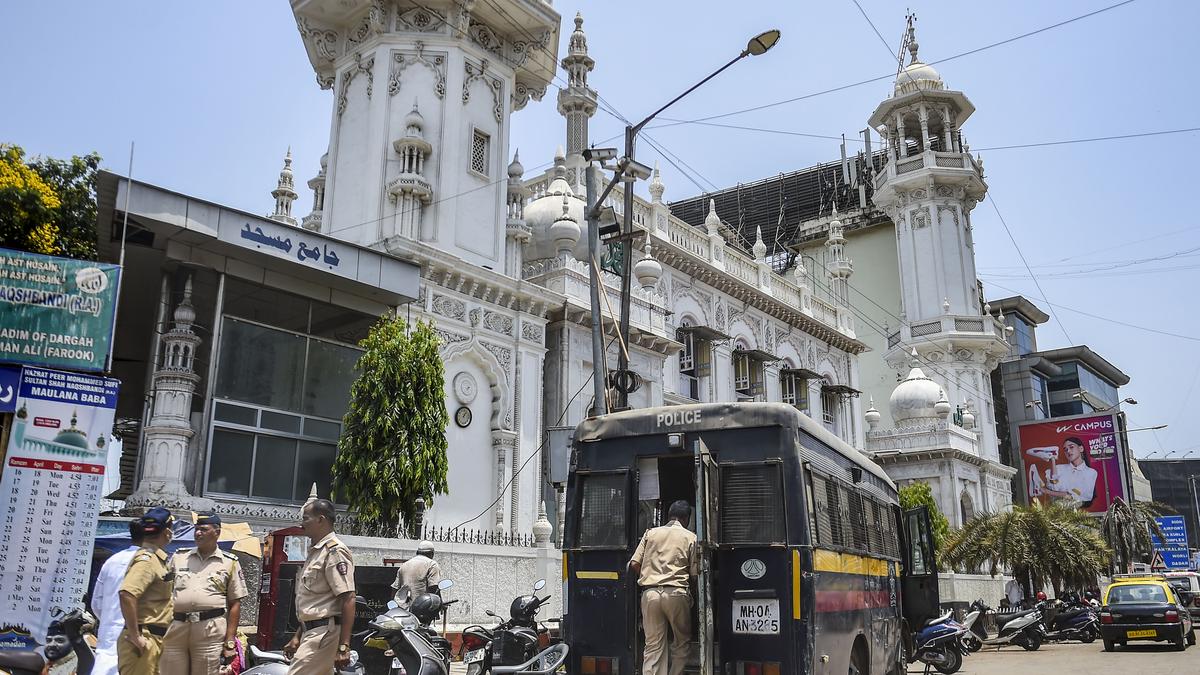
Image used for representative purpose only.
| Photo Credit: PTI
The Bombay High Court has directed the Maharashtra Government to file a detailed response on the maintainability of a Public Interest Litigation (PIL) seeking permission for 24 mosques to use loudspeakers for the Azan, in compliance with legal decibel limits.
The petition, filed by the Hazrat Khwaja Garib Nawaz Welfare Association Maharashtra through its General Secretary, Mohammed Yusuf Umar Ansari, seeks directions to allow regulated use of loudspeakers for the Azan in specific mosques.

The State Government has raised preliminary objections, questioning the locus standi and credibility of the petitioner. Government Pleader P.H. Kantharia submitted that Mr. Ansari is facing an externment order dated May 16, and had allegedly violated it by entering Mumbai to file the petition affidavit on July 4. Four criminal cases are also pending against him under the Indian Penal Code.
The State further submitted that an audio clip circulated by Mr. Ansari, allegedly inviting 22,900 people to attend the court hearing, created a potential law-and-order issue, prompting additional police deployment around the High Court premises. It argued that, given his conduct and background, the court should not entertain the PIL.
Advocate Shaikh Imran Mubarak, appearing for Mr. Ansari, denied all allegations. The Bench of Chief Justice Alok Aradhe and Justice Sandeep V. Marne directed the State to file formal objections within two weeks, with the petitioner permitted to respond within two weeks thereafter.
“In order to enable us to decide with regard to the locus and maintainability of the PIL at the instance of the General Secretary of the petitioner, we deem it appropriate to direct the learned Government Pleader to submit objections to the maintainability of the PIL by way of objections after supplying a copy of the same to the learned counsel for the petitioner. Let the objections be filed within two weeks from today,” the Bench said.
“Needless to state that the petitioner shall be at liberty to file response thereto within a further period of two weeks from receipt of such objections,” it added.
The Bench also noted that a similar matter is pending and ordered both cases to be clubbed for a joint hearing after four weeks.
The petitioner argued that the Azan – the Islamic call to prayer – takes place five times daily, each lasting less than three minutes, without musical instruments or amplifiers that cause disruptive noise. He cited the Noise Pollution (Regulation and Control) Rules, 2000, and WHO guidelines to contend that the Azan falls within permissible sound levels in residential and silence zones.
Mr. Ansari has attached 22,900 signatures from citizens in support of reinstating loudspeakers at the mosques, asserting that other public noise sources – such as traffic, political rallies, and festivals across religions – often exceed 120 decibels without consistent regulatory enforcement.

He submitted that the Azan is delivered at fixed times – 5 a.m., 1 p.m., 5.30 p.m., 6.45 p.m., and 8.45 p.m. – and is integral to religious practice. The PIL seeks to prevent selective application of noise regulations that, he argued, disproportionately affect minority religious groups.
The petition names 24 mosques in Mumbai allegedly affected by the removal of loudspeakers, including the Dargah Hazrat Syed Makhdoom Shah and the Masjid Compound Trust.
Published – August 08, 2025 10:43 pm IST



